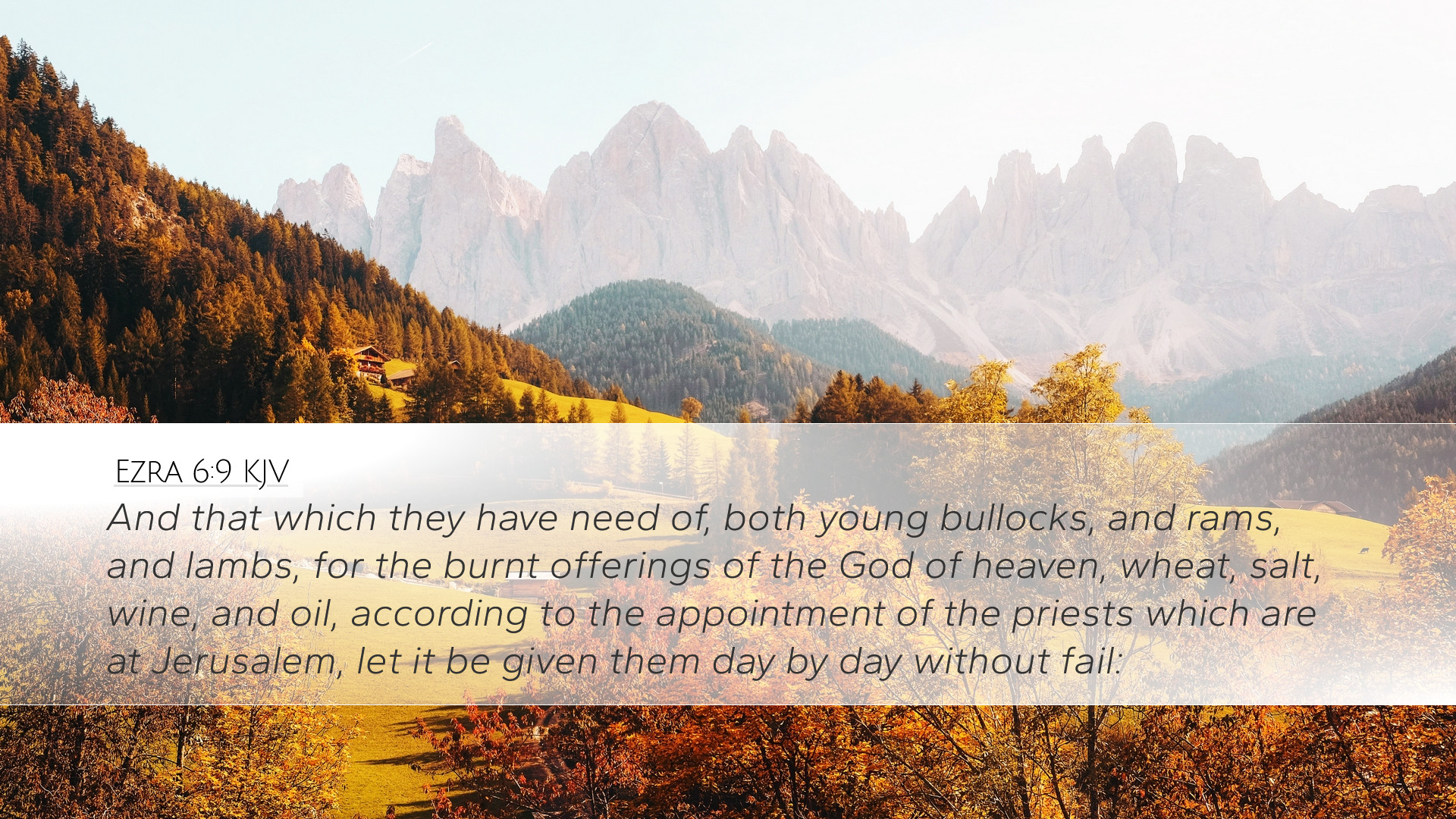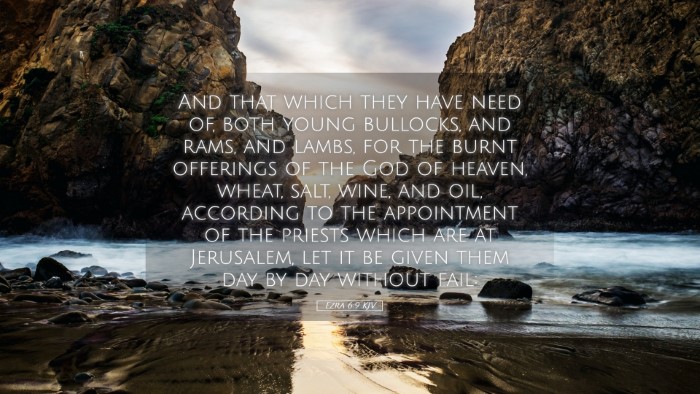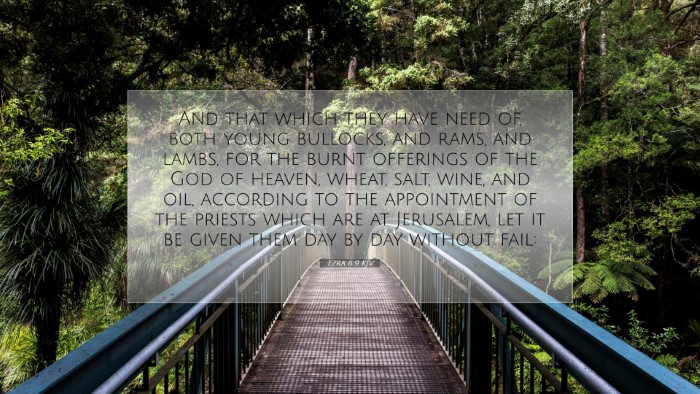Old Testament
Genesis Exodus Leviticus Numbers Deuteronomy Joshua Judges Ruth 1 Samuel 2 Samuel 1 Kings 2 Kings 1 Chronicles 2 Chronicles Ezra Nehemiah Esther Job Psalms Proverbs Ecclesiastes Song of Solomon Isaiah Jeremiah Lamentations Ezekiel Daniel Hosea Joel Amos Obadiah Jonah Micah Nahum Habakkuk Zephaniah Haggai Zechariah MalachiEzra 6:9
Ezra 6:9 KJV
And that which they have need of, both young bullocks, and rams, and lambs, for the burnt offerings of the God of heaven, wheat, salt, wine, and oil, according to the appointment of the priests which are at Jerusalem, let it be given them day by day without fail:
Ezra 6:9 Bible Commentary
Commentary on Ezra 6:9
Ezra 6:9 states: "And that which they have need of, both young bullocks, and rams, and lambs, for the burnt offerings of the God of heaven; wheat, salt, wine, and oil, according to the appointment of the priests which are at Jerusalem, let it be given them day by day without fail."
Contextual Analysis
This verse occurs within the broader narrative of the return of the Jewish exiles from Babylon and the rebuilding of the Temple in Jerusalem. The context is marked by the desire to restore proper worship and sacrificial rites after years of captivity. Matthew Henry emphasizes the importance of temple worship as a central aspect of Jewish identity and community restoration.
Henry notes that this decree highlights the recognition of God’s sovereignty and the necessary provisions required for worship in alignment with divine order. The text reveals the commitment of the Persian authorities to facilitate the Israelites in their religious observance.
Provision for Worship
Albert Barnes reflects on the nature and significance of the offerings specified in this verse. The mention of young bullocks, rams, and lambs indicates the variety of sacrifices intended to be offered daily, reflecting the importance of maintaining a continual devotion to God. These offerings were not merely ritualistic but representative of atonement, thanksgiving, and communal worship.
- Burnt Offerings: These symbolize complete surrender to God, as the entire offering is consumed in the fire.
- Wheat, Salt, Wine, and Oil: Each component embodies a different aspect of offerings, with wheat and oil often symbolizing the sustenance provided by God and wine representing joy in worship.
Understanding these items assists scholars and pastors in conveying the depth of Israel’s religious practices and their commitment to sacrificial worship as prescribed in the Law of Moses.
The Role of the Priests
Ezra’s reference to the priests who *are at Jerusalem* elucidates the organized structure of worship at the time. Adam Clarke comments on the leadership role of the priests in administering offerings and ensuring that worship fulfills its divine standards. This highlights both their authority and responsibility in spiritual matters, as they officiate the offerings and guide the people in rediscovering their faith.
Clarke emphasizes that the priests play a crucial role in mediating between the people and God, ensuring that sacrifices are acceptable and meaningful, thus maintaining a sacred relationship. This structure invites consideration of contemporary leadership in faith communities, underlying the necessity of qualified spiritual guidance.
Daily Devotion
The command for offerings to be given "day by day without fail" stresses the importance of *perseverance in worship*. Barnes urges readers to reflect on the discipline of regular worship and the necessity of maintaining a consistent relationship with God. Daily sacrifices suggest a rhythm of life founded on spiritual practices which can serve as a model for modern faith communities.
Matthew Henry expands on this idea, observing that such consistency in worship builds a resilient faith community, reminding believers of God's continual presence and provision in their daily lives. The importance of routine in spiritual life cannot be overstated, encouraging pastors and church leaders to foster environments where congregants can engage regularly in worshipful practices.
Theological Implications
This verse carries profound theological implications regarding God’s provision and the significance of communal worship. The offerings are a reminder that the provision of God is essential for sustaining a vibrant faith community. Henry posits that these provisions reflect God’s character — as a provider who desires fellowship with His people, emphasizing that worship should be rooted in gratitude and acknowledgment of His blessings.
Moreover, Clarke notes that the ongoing responsibility to provide offerings signifies a mutual relationship between humanity and divinity, where God's faithfulness calls forth a response of faith from His people. Understanding this interaction enriches the theological discussions around worship and offerings in both historical and contemporary contexts.
Conclusion
In concluding this commentary on Ezra 6:9, it is crucial for pastors, students, theologians, and Bible scholars to reflect on the layers of meaning embedded within this verse. It is not merely a directive for worship but encapsulates a community’s restoration, commitment to divine order, and the ongoing relationship between God and His people.
As you meditate on these insights, consider how they inform modern practices of worship and community life within the church today. This verse serves as a powerful reminder of the importance of dedication to God, the role of church leadership, and the necessity of consistent, heartfelt worship.


